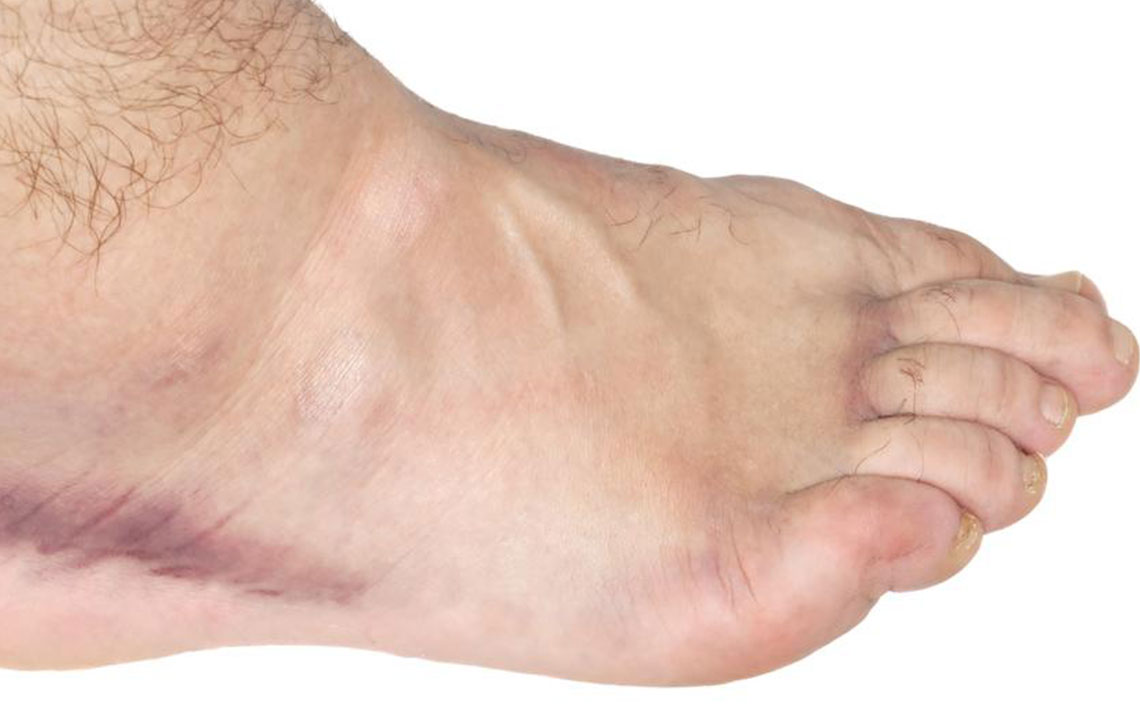Get Easy Relief from Your Swollen Ankle
If you have ever woken up from sleep after a long day of work only to find that your ankle has swollen unexpectedly, then you have landed on the correct page to look for some easy ways of swollen ankle treatment. However, before we jump to learn about its treatment, we will first have a brief understanding of what the situation is and how it is caused.
Swelling in the ankle and feet are very common phenomena. The medical term for such situation is called edema. When the body fluids get contained in a particular space in between the body cells, it results in the swelling of that region.

Symptoms of a swollen ankle
Symptoms of a swollen ankle can vary from very simple changes in the ankle to complicated issues. Some of them are mentioned below.
- There may be an increase in the ankle diameter.
- Change in skin color and texture of the ankle is a possibility. The skin at the swollen region is usually pale in color, while the surrounding regions have slightly darker marks.
- The swollen portion can be indented easily when pressed down with a finger, and upon release of applied pressure, the affected region again regains its puffy state.
Some other common symptoms include warm skin in the affected region, ulceration with some amount of pus drainage, high blood pressure, headaches, palpitations, puffy eyes, swollen hands or wrists, increased urination, and weight gain. Swollen ankle treatment will vary according to the severity of the symptoms.
Causes of swollen ankle and who it affect the most
Inflammatory cells or increase in fluid concentration in one particular region can be the reason behind swollen ankles. Some serious causes behind swollen ankle are as follows:
- Traveling for long days
- Standing on the feet for long
- Having any recent surgery
- Walking for some extended period of time
- Any kind of serious injury or trauma to the foot or ankle
- Any disease related to heart, liver, and kidney
Any kind of localized infection, - Swelling due to blockage of lymph fluid in lymph nodes or lymph vessels
- Blood clot
A large number of people can be at risk of suffering from swollen ankles. This includes pregnant women who are in their last trimester, people who do jobs that require them to walk or stand for long durations like salespeople, construction workers, mothers with small kids, obese individuals etc., and people who take anti-inflammatory drugs like steroids or NSAIDs, hormones, antidepressants, calcium channel blockers, and diabetes medicines as a regular part of their medication.
For the above-mentioned group of people, swollen ankle treatment should be carried out properly with all the necessary precautions.
Treatment for a swollen ankle
If you are looking to undergo an effective swollen ankle treatment, here are five tips that you should follow:
Leg elevation
The very first line of defense against swollen ankle is leg elevation. As soon as you start noticing any symptoms of a swollen ankle, elevate your legs above the level of your heart. Thereby, you will be putting a minimal amount of pressure on your lower back, knee, and thigh back, thus helping in reducing the swelling. You can take help of the leg wedges to elevate your legs. You can use them while sleeping, or while working at the office, or simply while sitting on a chair and watching TV or reading at home. You can also try doing various yoga positions like lying on the floor with your legs raised and pressed to the wall to achieve the required leg elevation posture.
Compression socks
This is a very effective method for swollen ankle treatment. Compression socks can be easily obtained from your local drug or grocery store. These do an efficient job at providing relief from pain and preventing the collection of fluid in your ankles, feet, and legs. As they come in three different varieties of light, medium, and heavy, be sure to select the variety of pair that doesn’t fit too tight for your ankles.
Exercise
Sitting or standing idly in one single position for too long will do no help towards swollen ankle treatment. In fact, it will further increase the swelling of your ankle. Hence, be sure to do proper exercises like swimming, which is a non-weight-bearing exercise that is really effective in soothing and relaxing the swollen skin. You can also try to flex, rotate, and extend your ankles and move your knees up and down to get some relief.
Epsom salt
Prepare a cool bath filled with Epsom salt and dip your swollen ankle/ankles in it for 15-20 minutes. This will help you get relief from swelling associated pain.
Medications
You can try taking some kind of antibiotics for your ankle infection or using a splint or wrap for a sprain.
We assure you that if you follow the above-mentioned swollen ankle treatment procedures you will definitely get good results.

